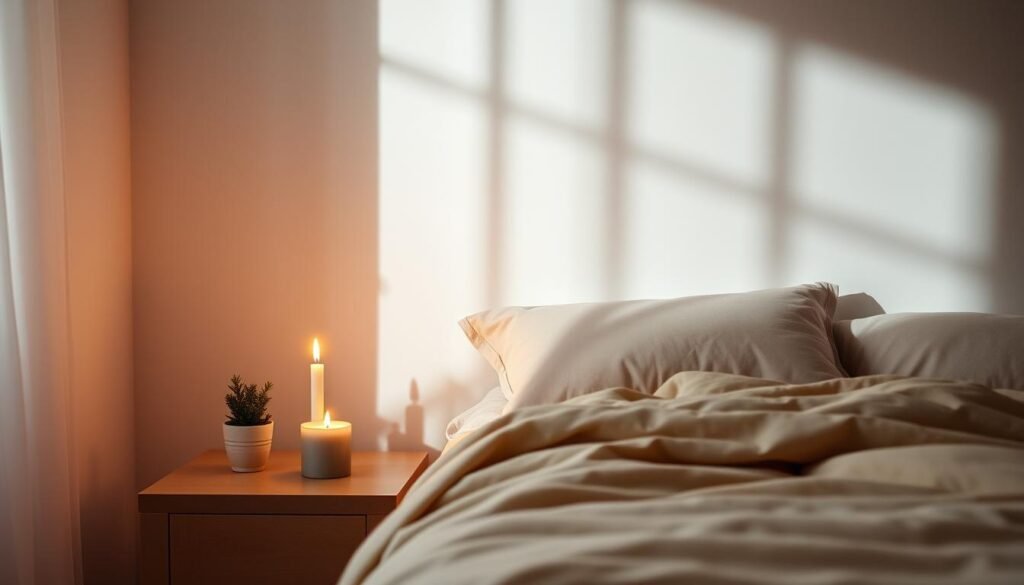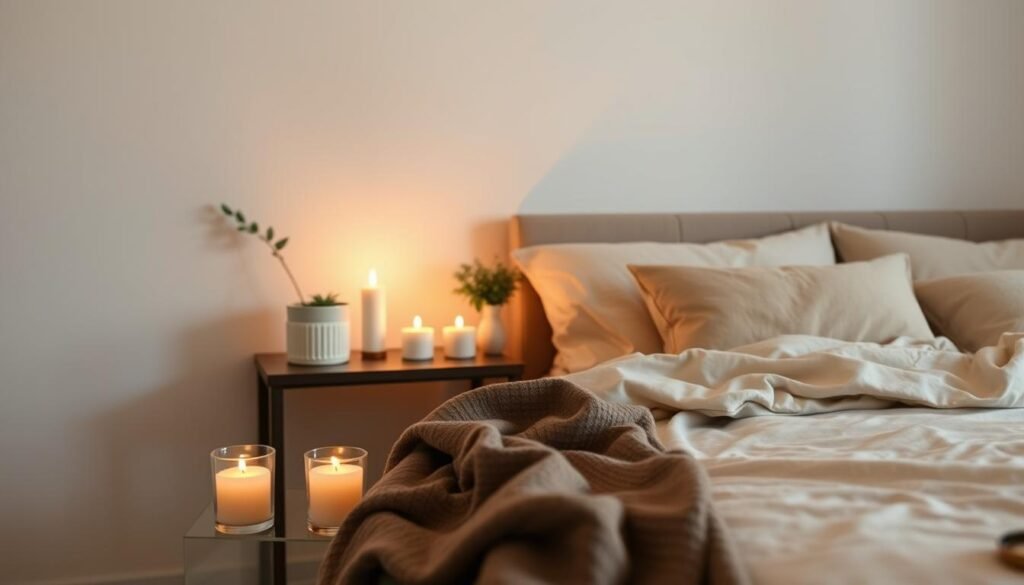Did you know up to 25% of men and 16% of women face sexual performance anxiety? This issue leads to problems like erectile dysfunction and premature ejaculation. Many feel pressure in bed and struggle to achieve close intimacy. It’s crucial to acknowledge and tackle this anxiety to improve intimate moments and relationships.
Talking about these issues is becoming easier as stigma fades. Exploring expert advice and strategies is key to overcoming performance anxiety. Methods like cognitive behavioral therapy and mindfulness help people regain confidence and boost their relationships. For more insights on sexual performance anxiety, its causes, and treatments, visit this comprehensive resource.
Key Takeaways
- Sexual performance anxiety is experienced by a significant percentage of both men and women.
- Understanding its causes, such as psychological factors and relationship issues, is crucial for improvement.
- Cognitive behavioral therapy is a recommended treatment option for addressing underlying anxieties.
- Regular communication with partners can foster a supportive environment to ease performance anxiety.
- Incorporating mindfulness techniques can enhance the sexual experience by reducing negative thoughts.
Understanding Sexual Performance Anxiety
Sexual performance anxiety is a common problem during intimate moments. It can make people feel nervous about performing well, affecting enjoyment and arousal. Both men and women are impacted, making it crucial to understand and address this anxiety.
Definition and Prevalence
This anxiety involves nervousness that impacts sexual activity. Up to 25% of men and 16% of women face it at some time. It significantly affects both their physical performance and sexual happiness.
How It Affects Both Men and Women
Men and women feel the effects of this anxiety differently. Men may deal with erectile dysfunction or premature ejaculation. These problems can be very upsetting.
Women might have trouble with arousal or lubrication. Worrying about body image also plays a role, affecting their desire and performance. Often, this leads to poor communication about sexual needs, making anxiety worse.
Common Causes of Sexual Performance Anxiety
Understanding sexual performance anxiety’s causes is key to beating it. Psychological factors, relationship issues, and worries about body image all play a part. Together, they can make intimate moments stressful.
Psychological Factors
Psychological factors are big in causing this anxiety. Inadequacy feelings, bad past experiences, and stress lead to worry. Men under 30 often feel this due to nervousness and lack of experience.
Those over 30 might struggle with work stress or personal issues, making anxiety worse. This stress can lead to problems like erectile dysfunction.
Relationship Issues
How partners get along affects sexual anxiety too. Worrying about pleasing your partner and tensions can create pressure. Doubts in a relationship can make anxiety grow, showing the need for open talks.
A study found this anxiety affects both men and women. It’s a shared issue that needs teamwork to solve.
Body Image Concerns
Body image issues greatly impact sexual anxiety. Social standards and self-expectations about looks affect confidence. People fear not living up to what they think is ideal.
This worry can hurt sexual confidence and function. Even those new to sex may fear judgment. For help, talking to a healthcare provider is a good step. They can suggest ways to manage this anxiety effectively.
The Impact of Performance Anxiety on Sexual Health
Performance anxiety can deeply affect sexual health. It can lead to problems like erectile dysfunction and premature ejaculation. These issues aren’t only physical. They’re often connected with emotional stress and can hurt relationships.
Erectile Dysfunction and Premature Ejaculation
About 30% of men face erectile dysfunction (ED) by the age of 40. Anxiety is a big reason behind it. This worry can make it hard to get or keep an erection. This issue can make feelings of not being good enough even worse. Also, around 20% of men are concerned about premature ejaculation, which adds to the anxiety. A study found that nearly 75% of men with ED also deal with performance anxiety. This shows how emotional issues are closely linked to these conditions.
Emotional and Social Consequences
The emotional impact of performance anxiety includes feeling anxious, depressed, and having low self-esteem. Many people feel less valuable, which affects their life outside the bedroom. Performance anxiety hits both men and women. About 25% of women face similar issues that affect arousal and lubrication. This can put a strain on relationships. Being open about these feelings is key to feeling better emotionally.
How It Affects Intimacy
Performance anxiety can harm the emotional bond between partners. Talking about these issues can make relationships better. Forty percent of those who talk about it see improvements in their sex life. Doing things together that aren’t sexual can also help. It can lower anxiety by up to 50%. Tackling these issues can make you healthier and your relationship stronger.
Looking into natural remedies, making lifestyle changes, or seeking professional advice can help with performance anxiety. These solutions can better sexual health and mental well-being. For tips, check out natural solutions. They could improve intimacy and boost your confidence.
Coping Strategies for Sexual Performance Anxiety
Managing sexual performance anxiety needs practical ways to handle it. Mindfulness and focusing on your senses can help a lot. They make it easier to enjoy being close with someone without worrying too much.
Mindfulness and Sensory Focus Techniques
Mindfulness helps you stay in the now, not thinking about worries. Just by breathing deeply or meditating, you can feel calm. This makes intimate moments more relaxed. Using your senses to enjoy touch and connection shifts the focus from worries to pleasure. Touching in a gentle, non-sexual way before getting intimate can help you feel closer and less anxious.
Open Communication with Partners
Talking openly about what you need is key to managing anxiety. When you share your worries, it brings you and your partner closer. A study in the Journal of Marital and Family Therapy shows that open talk improves your sex life. Women who say what they want are more likely to be happy in their intimate life. This shows how important talking and connection are for enjoying being close. To get more ideas on handling sexual anxiety, check out effective coping strategies.

| Coping Strategy | Description | Benefits |
|---|---|---|
| Mindfulness | Practices such as meditation and deep breathing to stay present. | Reduces anxiety and enhances focus on the moment. |
| Sensory Focus | Concentrating on physical sensations during intimacy. | Encourages connection and pleasure beyond performance. |
| Open Communication | Discussing sexual thoughts and needs with partners. | Builds trust, understanding, and fulfills sexual needs. |
Professional Help: When to Seek Therapy
Seeking professional help is a big step for those dealing with performance anxiety. There are different therapy options that can empower people. This support is vital for sexual dysfunction issues.
Many people face anxiety about sexual performance at various times. It’s important to know when to get help.
Types of Therapy for Performance Anxiety
There are several therapies for addressing performance anxiety. Some key types include:
- Cognitive Behavioral Therapy (CBT): This therapy changes negative thoughts that cause anxiety. About 75% find it improves sexual satisfaction.
- Sex Therapy: Focuses on open conversations about intimacy and personal worries. It helps improve sexual health and partner communication.
- Mindfulness Techniques: Practices like deep breathing and meditation lower anxiety. They encourage staying calm and present during intimacy.
Role of a Sex Therapist
A sex therapist is key in tackling performance anxiety. They help people and couples find what impacts their sexual health. Strategies they provide boost confidence and partner communication.
Many say that talking in a safe space reduces anxiety. This also makes intimate relationships better.
| Therapy Type | Focus Area | Success Rate |
|---|---|---|
| Cognitive Behavioral Therapy | Reframing negative thoughts | 75% |
| Sex Therapy | Communication about intimacy | Varies |
| Mindfulness Techniques | Reducing anxiety through presence | Varies |
Seeing a sex therapist is crucial for overcoming performance anxiety. It creates a space for open conversation crucial for intimate life navigation.
At-Home Techniques to Overcome Performance Anxiety
There are effective ways to handle sexual performance anxiety from home. These practices help to relax and bond. They improve your health, strengthen emotional ties, and lower stress tied to sex.
Physical Exercise and Its Benefits
Regular workout does wonders for your mind and body. It lifts your spirits, fights off stress, and boosts how you see yourself. Feeling better about your body can make you feel more confident. Studies show that staying active can boost sexual satisfaction by up to 25%. So exercise is key for overcoming performance worries.
Distraction Methods During Intimacy
Distraction techniques are useful when getting intimate. Playing calming music or chatting can ease the tension. This makes the time spent together more enjoyable. It helps keep anxiety from ruining the moment.
Intimacy Beyond Intercourse
Intimacy isn’t just about sex. Trying other forms of closeness can ease the pressure. Things like massages, cuddling, or kissing can bring you closer. Around 60% of people say these activities help lessen stress about performance.

Medication and Medical Options
Looking into medication can be crucial when dealing with sexual performance anxiety. Sometimes, medication offers the needed relief from anxiety and its symptoms. For example, treating erectile dysfunction might be advised if anxiety severely affects sexual performance. Knowing the different medication options is key for those looking for an effective solution.
When to Consider Medication
If someone constantly feels anxious about performance, affecting their intimate life, they should talk to healthcare providers. This is very important if issues like erectile dysfunction come up. It’s crucial to check if medical conditions or mental factors are causing the anxiety. PDE5 inhibitors might be recommended to help with erectile dysfunction symptoms and tackle the main reasons for performance anxiety.
Consulting with Healthcare Providers
Talking openly with healthcare professionals can help create a specific plan for managing performance anxiety. A healthcare provider can understand each person’s case, suggest the right treatment for erectile dysfunction, and talk about possible medication options. Getting help early means treatments can lower anxiety and improve sexual health.
Building Sexual Confidence
Building sexual confidence is about knowing your and your partner’s needs. It’s rooted in open talks about what each person likes and wants. These discussions allow both to share feelings safely, setting the stage for trust and deeper connection.
By talking openly, partners can discover their limits and what makes them happy. This creates a strong bond and boosts sexual confidence.
Understanding Personal and Partner Needs
Knowing what each person in a relationship needs is key for sexual confidence. Talking about what you like and your sexual goals makes you feel safe. It encourages being open which strengthens the bond and confidence between partners.
Being aware of what makes each person comfortable helps with anxious moments. It builds trust.
Addressing Body Image Issues
How we see our bodies affects sexual confidence a lot. Many worry about how they look, hurting their confidence. It’s important to understand that partners often don’t focus on flaws.
Highlighting what you like about yourself can help shift from feeling anxious to feeling accepted. Taking time for self-care and positive self-talk helps improve body image. This makes sexual experiences better.

Overcoming Performance Pressure
Performance pressure can really impact how someone feels about sex, making it crucial to ease off those tough expectations. Shifting focus towards simply enjoying the encounter can greatly improve how intimate moments feel. This move can create a more relaxed vibe and let real connections grow.
Shifting Focus from Performance to Pleasure
When people think more about the journey rather than the goal, they tend to feel more at ease and involved. Getting partners to live in the moment helps lessen the worry associated with not meeting expectations. Some helpful ideas might be:
- Fostering open dialogue about desires and boundaries
- Participating in playful activities that strengthen emotional connections
- Exploring different forms of intimacy, like cuddling and massage, that boost bonds without the stress of performing
Learning to Embrace Imperfection
Understanding that every relationship has its ups and downs is key to embracing imperfection. Knowing that not all intimate times need to be perfect helps relieve stress. Here are some ways to help:
- Talking openly with your partner about your worries to build trust
- Being kind to yourself and allowing for mistakes
- Shifting how you think to focus on exploration, not judgement
Talking regularly and supporting each other can reduce worries about performance, building a safe place for sharing fears. By accepting the not-so-perfect moments, you can create deeper, more meaningful connections with your partners.
| Strategy | Benefit |
|---|---|
| Open Communication | Builds trust, reduces anxiety |
| Focus on Pleasure | Enhances enjoyment, reduces pressure |
| Emphasizing Imperfection | Encourages a relaxed, open atmosphere |
Conclusion
Beating sexual performance anxiety is key to better intimacy and sexual health. It involves knowing why it happens and how to tackle it. Things like stress, how we interact in relationships, and how we see our bodies can affect it a lot. People can boost their sexual confidence by getting advice, seeking help, and talking openly.
About 30% of people face this anxiety at some time. Actions like exercising or relaxing through yoga can cut down symptoms by half. Also, talking honestly with partners can make a big difference. This shows how important being close and talking is.
For more focused help, therapy can really help improve things. Understanding what we truly need and being real in our sexual experiences can lower anxiety. It helps build stronger and happier relationships. To get more info on beating sexual performance anxiety, check out resources from The Family Chemist.